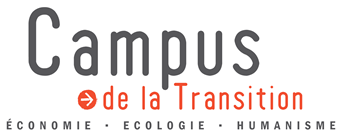The Campus de la Transition is located in Forges, a small rural commune of 430 inhabitants, in the Montereau-Fault-Yonne countryside – an hour southeast of Paris by public transport.
Although unoccupied for several years, the castle has been made available to the association. The buildings were in relatively good conditions, but they still required major restoration work and upgrading to meet the ecological values espoused by the Campus de la Transition. In 2018, the Campus de la Transition joined the Oasis project initiated by the «Colibris» movement», which supports the creation of living and resource places for a more environmentally friendly society. Thanks to the mobilization of volunteers for major clean-up, painting, brush, clearing and gardening projects, a small permanent community of 6 inhabitants has been settled in part of the castle since summer 2018.
Since then, the 18th century castle has been converted into an experimental eco-place that promotes environmental and social transition. Particular attention was paid to the overall coherence of the site with the values supported by the Campus de la Transition.
The Campus de la Transition has become a place for participatory research and action (see applied research pages), advocating sufficient and convivial living in a spirit of solidarity, committed to working with other local actors, and seeking ways to steer public policies in favor of sufficiency and social justice to create and share value while respecting planetary boundaries.
Today, the Campus de la Transition covers a 12-hectare landscaped park including gardens and a forest area, managed according to the principles of permaculture a permacultural design.
The NGO became a platform for experimenting with concrete issues such as :
- Tackling energy insecurity with a focus on energy consumption and energy for buildings. Focus is put on improving thermal comfort while reducing the amount of energy consumed;
- Reducing the carbon footprint of mobility by promoting cleaner modes of transport (soft and active);
- Promoting a healthy and varied diet with a homemade, vegetarian, organic, local and seasonal cuisine;
- Developing green fertilization methods with local farmers;
- Sharing goods, resources and space to experiment with sufficiency based on conviviality and solidarity;
- Experimenting with adaptative governance among the residents;
These different projects are a source of learning for students and researchers during their stays at the Campus. Visitors can take part in all the experimentations proposed by the residents and share feedbacks, ideas, and opinons on them. This form of involvement is part of the pedagogy supported by the Campus de la Transition, as it allows to create new ways of sharing knowledge and raising awareness about the climate and social transition. Trainees come out transformed from this immersive experience.
